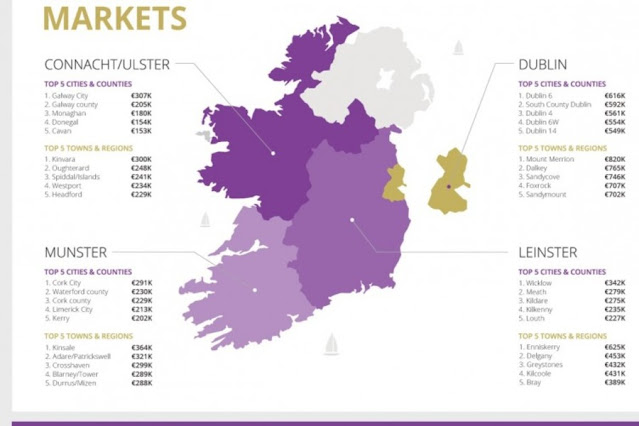3 - Aftermath, Recovery and Rising Property Prices
The global recession after 2008 affected Ireland disparately, primarily due to major domestic bank exposure to US sub-prime mortgage defaults, which forced the government to borrow €67.5bn from the IMF, the ECB and EC to prevent the banks capsizing. The tightening of credit caused a dramatic fall in national property prices and the boom in house-building left a vacancy rate of over 15% - keeping prices low as the government tried to induce recovery.
Source: Central Statistics Office
At
their lowest in 2013, Irish property prices fell 54.4%
from their 2008 peak. Prices in Dublin fell further, falling 59.1%
from their highest level, but recovering sooner
and further than national counterparts. From 2013, Irish prices gradually increased until
the time of writing. However, Dublin prices have diverged, exceeding the market
with prices up 11.5%
in the year to September 2021, with some areas in the city just 12%
off boom-era highs in comparison to the 40% deficit observed in more
rural areas.
Source: Daft.ie
Academics attribute this divergence to different factors. Lyons points to a shortage of housing in the Greater Dublin area, with a ‘population growth unmet by new additions to housing stock’. This is contrasted by columnist John Harris, who states that the same area has ‘30,000 empty homes’ – instead identifying Ireland’s corporate tax rate as a price driver - drawing highly paid employees of multinationals, pushing up local rents.
Source: Placetech.net
Another
echo of the Celtic Tiger bubble is a new wave of government-incentivised
institutional investment from the US, Europe and increasingly, China. Funds, including
infamous ‘vulture
funds’, are seeking secure investments in bricks-and-mortar projects, outbidding
first-time buyers and making home ownership a virtually unattainable prospect
for some.
Source: Foil Arms and Hog
These
factors come amid a sharp rise
in general inflation. Several factors have accelerated property price
increases since the start of the Covid pandemic including a lull
in construction, remote working, and increased savings - contributing to an
already escalating housing crisis in Dublin.






Comments
Post a Comment